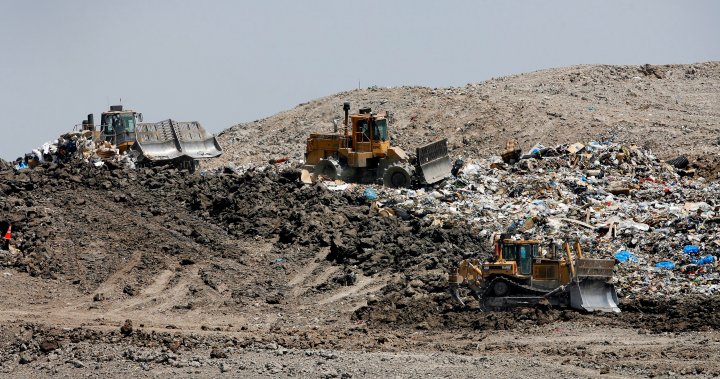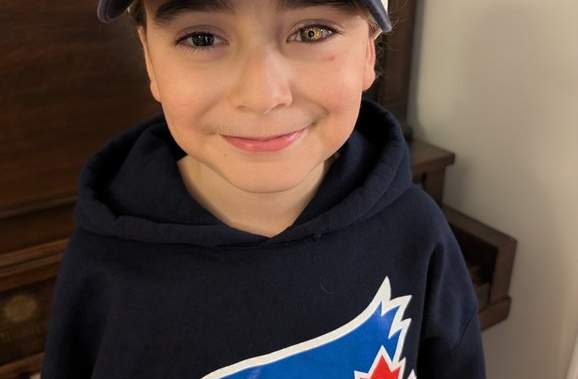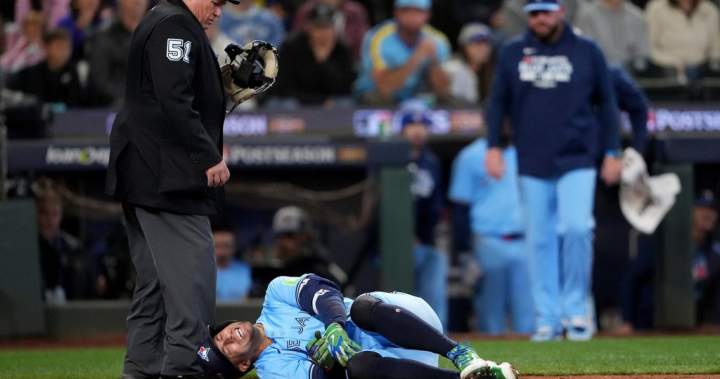Toronto to consider incineration as landfill capacity dwindles

Toronto’s main landfill is projected to reach capacity by 2035, and the city is now asking residents and businesses to weigh in on how waste should be managed for the next decade and beyond.
With the Green Lane Landfill not able to keep up with the growing amount of waste, the city is exploring alternative methods of waste management, including the controversial option of incineration.
Now in Phase 2 of updating its Long-Term Waste Management Strategy, the city is asking for insight from the public to help guide waste management from 2026 to 2036.
This phase focuses on evaluating options to address the city’s waste management needs and gathering public feedback on potential solutions.

Get breaking National news
For news impacting Canada and around the world, sign up for breaking news alerts delivered directly to you when they happen.
The survey consists of a series of questions, including implementing recycling programs, donation drives and energy-from-waste, which involves converting garbage to electricity or heat by burning it at high temperatures.
This method could counter Toronto’s goal of becoming a zero-waste city and transitioning to a circular economy, as stated on the city’s website.
According to a provincial study done in 2021, it found that by 2034, there will be no remaining landfill capacity in Ontario.
The study found municipalities are beginning to utilize private landfills, which as of 2020 made up 53 per cent of active landfills in the province.
Toronto sends an average of 450,000 tonnes of waste per year to the Green Lane Landfill near St. Thomas, Ont., roughly the equivalent of three CN Towers full of trash.
While the city has managed to slightly extend Green Lane’s lifespan through contract renegotiations and improved compaction practices, the clock is ticking.
Last year alone, the city handled close to 830,000 tonnes of waste across all streams, and Toronto has no suitable land within its borders to build a new site.
Provincial legislation introduced in 2020, known as Bill 197, allows municipalities to veto any proposed landfill site within 3.5 km of their residential boundaries, further limiting the city’s already slim options.
The consultation period is open until June 29, and residents are encouraged to participate.
— with files from Aaron D’Andrea
© 2025 Global News, a division of Corus Entertainment Inc.


TORONTO – Eight-year-old Logan Dorna is cheering on the Blue Jays in their playoff run while sporting their logo on his prosthetic eye.
Logan’s left eye was removed at the Hospital for Sick Children in Toronto after he was diagnosed with retinoblastoma — an eye cancer — when he was six months old.
Matthew Milne, an ocularist who works with the hospital’s eye cancer team, made Logan’s first artificial eye as a baby and replaces it with a new one about every two years as he grows up.
When Logan came to see Milne a couple of weeks ago for his next prosthetic eye, he had something specific in mind.
“I wanted to get the special eye because I like playing baseball and I like watching it too,” he said in a video interview with his parents from their home in Richmond Hill, Ont., on Friday.
Milne, who hand-paints the artificial eyes, made Logan one with a gold iris and baseball seams.
He painted the Blue Jays logo on top of the eye. Unlike the gold and the seams, it’s not possible to make the logo visible to others because the top is tucked back into the eye socket.
Related Videos
But Logan knows it’s there and can show others when he swaps that eye out for a second “everyday” prosthetic eye. That one has a brown iris to match his seeing eye.

Get weekly health news
Receive the latest medical news and health information delivered to you every Sunday.
It also has a special painting on the top that reflects his interests: a character from the “Zelda” video game series.
Milne encourages his young patients to pick fun images for the tops of their prosthetic eyes.
“When you’re dealing with a very kind of adult issue like retinoblastoma, I want to always give kids the opportunity to kind of customize something for themselves, make it fun for them,” he said.
Logan’s mom, Taline Dorna, said her son has been wearing his Blue Jays eye “every time the Jays have been playing because he believes in his soul that it’s giving them a little bit of extra luck.”
The sports theme is also a celebration of how much Logan overcame in the summer when he started playing baseball for the very first time, she said.
“Having just monocular vision, depth perception is really off. So whenever he hit that ball … (it) really gave him that boost of confidence.”
When he’s not batting — Logan’s favourite part of the game — he’s “usually right field but sometimes middle and left,” he said.
Dorna and Logan’s father, Serge, hope that their son’s embracing of his artificial eye inspires other children with differences to feel proud and be welcomed.
“That’s what we’ve always wanted for him … no social stigma attached to having a prosthetic eye because it is such a visible difference,” Dorna said.
“We want him to always feel confident and not ashamed of who he is because it’s part of his identity.”
Logan’s prosthetic eye is connected to ocular muscles so it can move in sync with his seeing eye when he’s looking around, even though there’s no vision there, Milne said.
Retinoblastoma is rare — there were 15 cases in children 14 years and under in 2019 — but it’s the most common type of eye cancer in children and often found under the age of two, according to the Canadian Cancer Society’s website.
Removing the cancerous eye helps prevent the tumour from spreading elsewhere. After Logan’s eye was taken out, he didn’t need any further treatment such as chemotherapy or radiation, his mother said.
He now goes for checkups at SickKids’ eye clinic once a year and sees Milne every few months to maintain his prosthetic eye.
This report by The Canadian Press was first published Oct. 18, 2025.
Canadian Press health coverage receives support through a partnership with the Canadian Medical Association. CP is solely responsible for this content.
© 2025 The Canadian Press

A new clinical trial at Kingston Health Sciences Centre could mark a turning point in how anxiety is treated in Canada.
For the first time in Canada, researchers are studying the effects of micro-dose psilocybin, the active ingredient found in magic mushrooms, on people living with generalized anxiety disorder (GAD).
“There are significant unmet needs among people living with generalized anxiety disorder, and they are seeking effective, well-tolerated treatments,” said Dr. Claudio Soares, principal investigator and attending physician in KHSC’s Mental Health and Addiction program.

Get weekly health news
Receive the latest medical news and health information delivered to you every Sunday.
Psilocybin is being tested for its potential to reduce anxiety without causing hallucinations.
“Not everybody has access to treatment, but also not everybody can tolerate medications for anxiety,” said Soares.
“They might have sexual dysfunction or weight gain. So we’re always looking for novel alternatives, novel treatments, and psilocybin has emerged as one of the options to treat anxiety disorder.”
The study will run over eight weeks and involve up to 60 participants taking either psilocybin or a placebo daily at home.
Researchers say the initial results are encouraging, with some participants noticing reduced anxiety within the first week.
“This study represents a major shift, a new way of targeting anxiety by engaging the brain in novel ways, but without the sedation or emotional numbing caused by many of the current medications used to treat anxiety,” said Soares.
With more than 1.6 million Canadians affected by GAD, researchers are hopeful the trial will offer a safer and more accessible treatment alternative.
If successful, larger-scale studies could follow, bringing new hope to those living with anxiety.
© 2025 Global News, a division of Corus Entertainment Inc.

SEATTLE – Blue Jays designated hitter George Springer left Game 5 of the American League Championship Series due to a right knee injury.
Springer was hit by a 95-m.p.h. pitch thrown by reliever Bryan Woo in the seventh inning of Friday’s game at T-Mobile Park. Toronto led 2-1 at the time.
Springer was replaced in the lineup by Joey Loperfido, who was added to the 26-man roster on Thursday after outfielder Anthony Santander was ruled out with a back injury.
Related Videos
Springer was hit in the side of the knee and immediately crumpled to the ground in the batter’s box. A team trainer, joined by manager John Schneider, came out of the dugout for assistance.

Get daily National news
Get the day’s top news, political, economic, and current affairs headlines, delivered to your inbox once a day.
The 36-year-old Springer got to his feet and tested the leg by slowly walking to first base before deciding to leave the game.
Springer, who drove in Toronto’s first run of the game in the fifth inning, is hitting .256 in the post-season with three homers and six RBIs. He hit .309 in the regular season with 32 homers and 84 RBIs.
Following the game Jays manager John Schneider said X-rays were negative on Springer’s knee.
This report by The Canadian Press was first published Oct. 17, 2025.
© 2025 The Canadian Press
-

 Uncategorized4 months ago
Uncategorized4 months agoShop Proud, Eat Proud, Be Proud — Ottawa Canada Day Market This June 28th
-

 4 months ago
4 months agoRing of Fire road to bring prosperity to First Nation, problems for caribou: report
-

 4 months ago
4 months agoMeasles circulating in northeastern B.C. community, health officials warn
-

 4 months ago
4 months agoCanada’s world junior trial saw juries tossed, intense testimony. Here’s a recap
-

 4 months ago
4 months agoFormer major leaguer, Jays doctor Ron Taylor dies
-

 4 months ago
4 months agoJagmeet Singh apologizes for attending Kendrick Lamar concert after Drake calls him out
-

 4 months ago
4 months agoAnishinabek Nation chief says he briefed Ontario police on protests against Bill 5
-

 4 months ago
4 months ago161 bricks of suspected cocaine found on truck trying to cross Canada-U.S. border








